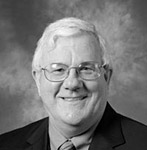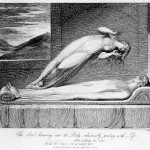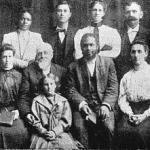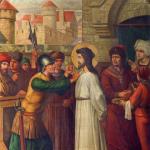 At SBL, I had the great privilege of responding to Dr. Luke Timothy Johnson in a panel discussion regarding his book Among the Gentiles. Johnson is a legend and I was quaking in my boots (sneakers really) just thinking about it, but it was a lot of fun and he is a lively speaker.
At SBL, I had the great privilege of responding to Dr. Luke Timothy Johnson in a panel discussion regarding his book Among the Gentiles. Johnson is a legend and I was quaking in my boots (sneakers really) just thinking about it, but it was a lot of fun and he is a lively speaker.
I just finished reading LT Johnson’s outstanding Prophetic Jesus, Prophetic Church: The Challenge of  Luke-Acts to Contemporary Christians (Eerdmans, 2011). Here is what we might call a prophetic commentary. Johnson’s work is exactly the kind of Biblical studies research and thinking that can really change the church for the better – it is neither fluff nor esoteric ramblings about philology or history.
Luke-Acts to Contemporary Christians (Eerdmans, 2011). Here is what we might call a prophetic commentary. Johnson’s work is exactly the kind of Biblical studies research and thinking that can really change the church for the better – it is neither fluff nor esoteric ramblings about philology or history.
What is the book all about? Johnson believes that the Gospel acc to Luke and Acts (as two parts of one great prophetic narrative by Luke) is especially fit for igniting a fire under Christian communities, encouraging them to live our their vocation in God, guided by Christ and empowered by the Spirit.
One major plank in his argument is that it is wrong when scholars think of the Jesus of the Gospel of Luke as prophetic, but not the church of the book of Acts as prophetic. Luke-Acts is designed in such a way as to demonstrate Jesus as a prophet in Luke, then the early apostolic church carries on Jesus’ prophetic ministry in Acts, and this is a model for the church today to continue this prophetic ministry.
One initial conceivable obstacle to Johnson’s argument is that the NT canon separates Luke and Acts and shoves John in the middle (so the two are not read side-by-side). Johnson writes,
[Luke] could not have imagined that the process of making his composition part of the NT canon would separate the two parts of his single story, so that his account of ‘what Jesus did’ would appear with the other Gospels, while his account of what Jesus’ witnesses did and said would serve to introduce the letters of Paul (p. 1).
Johnson, in a way, is discouraging us from reading the NT primarily according to canonical order. He argues, “canonical arrangement does not determine how canonical compositions are to be read” (3). [Brevard Childs is rolling around in his grave!] Johnson goes on: “We are not obliged to read Hebrews as a letter written by Paul simply because many early Christians so regarded it and some ancient manuscripts place it among Paul’s letters. Nor does the canonical placement of James or Revelation demand that we read them as either later or lesser than Paul. The accidents of canonical arrangement do not constrain interpretation” (3).
OK, I don’t think Johnson has to work too hard to convince me to read Luke and Acts together, but what does it mean to see prophetic Jesus and prophetic church? Basically, using the OT models, a prophet is marked by “being inspired by the Holy Spirit, speaking God’s word, embodying God’s vision for humans, enacting the vision through signs and wonders, and bearing witness to God in the world” (p. 4).
Here is where Johnson is stepping out and being radical: “Luke shows the church in Acts to be even more radical than the prophet Jesus” (4). Part of what Johnson is getting at is that Acts is not just a second part of a book of history. It has a prophetic voice which calls out to the church.
The first readers of Luke’s narrative would perhaps not have seen his story as nostalgic recollection of a time past but rather as a summons to an ideal that might be in danger of being lost, not as a work of bland historiography but as a thrilling act of utopian imagination, less a neutral report of how things were than as a normative prescription for how things ought to be (5)
Part of the reason Johnson writes this book is to rehabilitate scholarship on Acts. Everyone likes the Jesus of the Gospel of Luke, but Acts has a history of representing a magisterium-church, a fossilization of the vision of Jesus. Johnson, by directly linking Acts with Luke, shows how radical Acts really is by un-muzzling its prophetic voice. Johnson captures Luke’s vision for the church in this way
What would make a church prophetic in Luke’s view is its total dedication to responding to the call of God in every circumstance, more than to cultivating institutional self-interest…Whether small or large, simple or complex, local or universal, the essential character of the church must be the desire to answer to the living God (70)
The substantive message of the book takes place in 5 chapters: the prophetic Spirit, the prophetic word, prophetic embodiment, prophetic enactment, and prophetic witness. For each chapter, first Johnson describes the prophetic element as it appears in Luke, then Acts, and then he offers “Challenges for the Church Today.” This ends up being a kind of thematic commentary with application, but because it is Johnson communicating, it packs a wollup of a theological punch!
Here are some of my favorite insights:
Prophetic Word:
The prophet announces ‘God’s rule,’ meaning what God has done and is doing among humans for their salvation and what this demands of humans in response: repentance for the forgiveness of sins, living by a new measure of success and failure, doing the deeds that demonstrate repentance, growing into full maturity. (p 89)
[Repentance means] a commitment to live by the reversal of values and behaviors demanded by the good news of God’s rule (92)
Prophetic Embodiment
If Luke continues to show prophetic embodiment in the new community formed by the Holy Spirit in Acts, this means that, in his view, the Jesus movement reached its fullest expression in the earliest church and was at least as radical in its character as was the one through whose spirit it exists (109)
Johnson outlines 4 values of prophetic embodiment that challenge the church today: prayer, poverty/sharing possessions, itinerancy, and servant leadership. Under prayer he made this powerful statement about worship
The single greatest countercultural act Christians perform is to worship together and proclaim that Jesus is Lord. To cease from the constant round of commerce and consumption, to resist the manipulation of media that insists that working and possessing defines worth, and to proclaim with the body language of communal gathering that Jesus, not any other power, is Lord is to enact the politics of God’s kingdom and to embody the prayer ‘your kingdom come.’ (124)
I was a bit confused by what Johnson means by “itinerancy,” but it has something to do with living “lightly” so that you can pick up and go whenever God’s spirit calls you to go for service. Johnson takes a shot at the Vatican for being too fixed in a system of leadership and settlement and movement to make it difficult for the Spirit to utilize their “lightness.” (to be fair, he criticizes all sorts of other groups as well!)
Prophetic Enactment
This involves habits of the prophet like healing and exorcising demons. Plenty of this going on in Luke-Acts and it is surely a sign of God’s full-force attack against the powers of the world beset by sin. But I was very curious what Johnson would do when it comes to translating this for the church today. He tends to take the evil and demons of the world like NT Wright does, calling governmental corruption “evil” and fighting all kinds of trafficing and abuse as “demonic.” What about “healing”? Johnson does not talk plainly about it in the ways I was hoping, but his concluding thoughts are very apropos.
The church should think of healing in terms of caring more than in terms of curing. The first aspect of Luke’s healing stories is the simple seeing of the one afflicted. Such seeing requires that the church, like Jesus, must be among the afflicted…The second aspect is touching. Illness of every sort bears a stigma with it…The gesture of touch removes the stigma and begins the restoration to human community. The third aspect is placing in the midst. When the church refuses to segregate the afflicted, but rather seeks to construct forms of community that place the afflicted at the center rather than at the margins of life, it truly carries out the ministry of healing as a prophetic enactment. (165)
Prophetic Witness
Johnson acknowledges that many Christians today think they know what “witnessing” is – telling people they are sinners and to turn to Jesus. He does affirm that witnessing does require words, but it is not words alone.
It does not matter much what the church declares to the world concerning the resurrection if its common life does not embody the truth of the resurrection. (184)
This book was a breath of fresh air for me – and not just because it is free of footnotes/endnotes! If you are teaching a course on Luke or Acts, I would strongly urge you to consider having your students engage with this book – especially if they are planning to be in ministry leadership!















